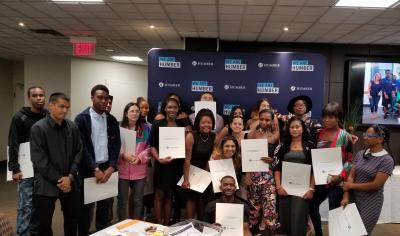
Scotiabank announced a donation of $500,000 to Humber College’s Youth Transition Program (YTP).
The YTP, a free academic access program that helps people aged 19 to 29 find their path to higher education, will receive funding to deliver program activities and provide program participant access.
Scotiabank Meaningful Futures Scholarships will also be established and will be awarded each year providing 48 scholarships to YTP graduates who enroll in a program of study at Humber and have demonstrated financial need.
Scotiabank’s gift is a meaningful way to help young people increase their employment prospects and opportunities by removing barriers to advancement and increasing access to education. The commitment to Humber is part of ScotiaRISE, the bank’s 10-year, $500 million initiative that aims to promote economic resilience among disadvantaged groups.
“Our investment will propel two initiatives at Humber – the Youth Transition Program and the Meaningful Futures Scholarships,” said Maria Saros, vice president and global head of social impact at Scotiabank. “Both programs align perfectly with ScotiaRISE’s mission to help disadvantaged groups participate more fully in the economy. A key component of being able to participate in the labour force is obtaining the necessary skills and education required for a certain career. Together, Humber and ScotiaRISE are helping to remove some of the traditional barriers to education by helping students transition to college and arming them with the funds needed to graduate.”
Humber President and CEO Chris Whitaker lauded Scotiabank for its generous support of the YTP, a specialized program that provides participants with an immersive post-secondary experience that includes advising, mentoring, career exploration and core academic skill-building while making meaningful connections to ongoing supports that will ease their transition to post-secondary.
“This support from Scotiabank will help Humber to continue to provide deserving students with the opportunity to achieve academic and career success,” said Whitaker. “The Youth Transition Program creates a clear pathway to higher education with the supports in place to help students succeed.”
Geraldine Babcock, director, Community Outreach and Workforce Development at Humber, said “Scotiabank’s gift will provide a solid foundation for the YTP and increase its capacity to provide access to post-secondary education for diverse youth in our local communities.”
Scotiabank’s funding means Humber can hire a full-time student support advisor. It will also help with the costs of instructional supplies and outreach and will address financial barriers faced by students such as travel expenses.
In addition, the bursaries “make the pathway to post-secondary a reality for many youth who face financial need,” said Babcock, adding that there are also a number of young parents enrolled in the YTP.
“We are proud to support Humber in their endeavor to drive student success by helping youth continue to post-secondary education,” added Saros. “We recognize the importance of education in helping individuals gain financial independence, build successful careers, and contribute to their local economies at their fullest potential.”

Graduates of the YTP said in an online testimonial video the program was very helpful and that it motivated them when it came to pursuing their post-secondary education.
More than 340 students have participated in the YTP since it began in 2017 with a 90 per cent completion rate. Approximately a third of the students enrolled did not have all their high school credits to meet the requirement for their Ontario Secondary School diploma but wanted to find a pathway back to furthering their education. Upon completion, each student has an individualized plan of action developed with a Student Success Advisor that identifies the next steps they need to take to prepare for entrance into their chosen post-secondary program, further training and/or employment.
The YTP was created with collaboration from community partners and is rooted in local racialized communities – 86 per cent of program participants are racialized students with the majority self-identifying as Black/Caribbean. The program is an example of Humber’s ongoing commitment and strategy to address equity, diversity and inclusion. To learn more about the college’s commitment, read Humber’s Equity, Diversity and Inclusion Framework and Strategy.